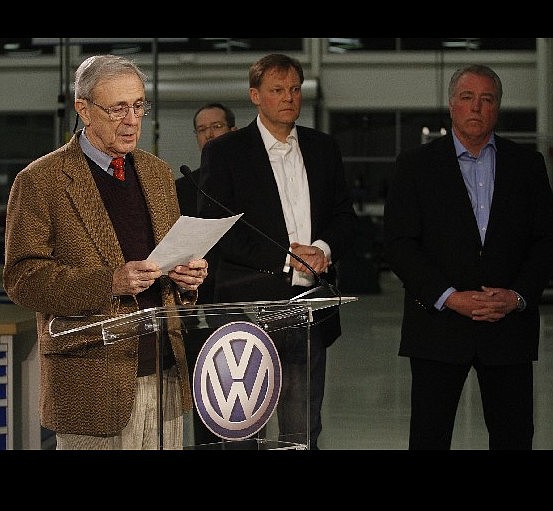UAW appeals union vote at Chattanooga's Volkswagen plant
Saturday, February 22, 2014
The United Auto Workers on Friday sought a new election at Chattanooga's Volkswagen plant, alleging that interference by politicians and outside groups hurt the union's case in last week's vote, which ended with workers rejecting the UAW.
Filed with the National Labor Relations Board, the appeal cited a "coordinated and widely publicized coercive campaign" by politicians and special interest groups to deprive VW workers of their right to join a union.
The filing noted U.S. Sen. Bob Corker's statement during the election that should workers reject the UAW, he had assurances VW would bring a second vehicle assembly line to Chattanooga.
The UAW charges also claim intimidation from Republican state legislators who linked future economic development incentives for the VW plant to a rejection of the union.
The union said that "the 'fist' of the state officials' threats about tax incentives for a new product line was amplified by the 'velvet glove' of a United States senator."
However, Corker and others fought back after the filing was made public Friday afternoon. The former Chattanooga mayor said workers "clearly spoke" during the vote. VW workers rejected the UAW by a vote of 712 to 626.
View our Volkswagen/UAW special page with timeline, slideshow, local and national coverage and opinions
Corker also said the appeal may slow down the automaker's decision on where to produce a new sport utility vehicle. VW is considering Chattanooga or Mexico.
"This complaint affirms the point many of us have been making: that the UAW is only interested in its own survival and not the interests of the great employees at Chattanooga's Volkswagen facility nor the company for which they work," the Tennessee Republican said in a statement.
Maury Nicely, an attorney for the anti-UAW group Southern Momentum, said the UAW's objection "has the feel of a 'Hail Mary'" and he called the allegations "long-shot claims."
The National Right to Work Foundation said the UAW is "blaming everyone but themselves."
Mark Mix, the foundation's president, said Chattanooga VW employees managed to "stave off a coercive unionization campaign" even though the UAW and VW officials stacked the deck against the workers.
Mix said foundation attorneys plan to exercise "every legal option for workers who support the election's result, because they are concerned that Volkswagen will not actively defend the employees' vote."
U.S. Sen. Lamar Alexander, R-Tenn., said in a statement that "labor laws are written to allow employees to decide whether they want a union, not to ensure that unions win."
VW had no immediate comment on the filing.
However, the UAW said in the filing that a vote can be set aside based on "third-party misconduct" that created a general atmosphere of fear or reprisal rendering a free election impossible.
The UAW charged that Corker "knew exactly what he was doing: He was purporting to deliver from the employer, in the midst of an election, a promise of benefit if workers voted against the UAW."
"It's an outrage that politically motivated third parties threatened the economic future of this facility and the opportunity for workers to create a successful operating model that would grow jobs in Tennessee," said UAW President Bob King in a statement. "We're committed to standing with the Volkswagen workers to ensure that their right to have a fair vote without coercion and interference is protected."
Gerard Stranch, a Nashville attorney unrelated to the case, said Corker's statement created individual pressure on VW employees.
Stranch, an attorney for the Tennessee Democratic Party, said Corker's remark and comments by other Republican legislators were "beyond the pale."
But, John Raudabaugh, a former NLRB member, said the UAW's "substantive content is off mark" in the filing.
In terms of alleged coercion by outsiders, he said the union "needs to look in the mirror." Raudabaugh, who also does work for the Right to Work Foundation, said the UAW and VW dictated to plant employees who and how people could be heard during the lead-up to the vote and during the election.
Ed Hunter, a VW employee who supported the union, said he's happy about the UAW filing the objection.
He said he believes the statements by Republican politicians affected workers who were undecided about how to vote.
However, Sean Moss, a VW worker against the UAW, said President Barack Obama weighed in on the election, claiming that Republican lawmakers were supporting German shareholders rather than Chattanooga workers.
"If that's not outside interference, then clearly I don't know the definition," he said.
It's immediately unclear how long it will take for the NLRB appeal to come to a conclusion.
Stranch said the case will go to a hearing officer and administrative law judge, who will make a finding.
"It should move pretty quickly," he said.
Raudabaugh said there could be a hearing and it may take months for the case to wind its way through the NLRB process.
Contact Mike Pare at mpare@timesfreepress.com or 423-757-6318.

